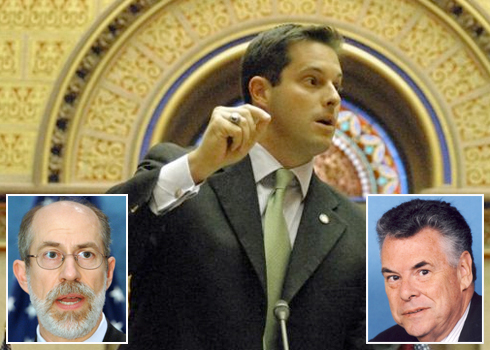A New York State Senator is taking a cue from Rep. Peter King (R-NY) and holding hearings on Muslim radicalization on Friday in New York City, featuring testimony by anti-Islam mainstay Frank Gaffney, and even King himself.
State Sen. Gregory R. Ball (R), who chairs the Senate Standing Committee on Veterans, Homeland Security and Military Affairs, announced the hearings in February as a way to assess the city’s preparedness for another terrorist attack. He said in the initial press release that “as New Yorkers we live in the world’s most likely terrorist target and as the ten year anniversary of 9-11 grows near, we must assess the measures that are being taken to protect our citizens from these types of threats, as well as what preventative measures we should be taking to ensure our continued safety.”
Ball defended the hearings to the New York Times, saying that though he’s not planning to focus on one particular group, “there are people who seek to hurt and destroy us. We have to move beyond political correctness.”
On the witness list are uncontroversial experts like Richard Daddario, the top counterrorism official in the NYPD, Douglas Ziegler, the MTA’s Head of Security, Charles Faddis, a former CIA operation officer, and Thomas Labelle, the executive director of NYS Fire Chiefs Association.
But the hearings will also discuss the threat of sharia law in the U.S., a pet issue of Islamophobic elements on the right. And some of the witnesses are prominent figures in the right’s recently heightened campaign against the supposed threat of sharia.
Nonie Darwish, for one, is the director of Former Muslims United, and has argued that Islam “will destroy itself because it’s not a true religion.” She also once said that “a mosque is not just a place for worship. It’s a place where war is started, where commandments to do jihad start, where incitements against non-Muslims occur. It’s a place where ammunition was stored.”
Then there’s Frank Gaffney, who has been fearmongering about sharia law for years, becoming the right’s resident “expert” on the topic. He was even brought in to testify in a lawsuit against a proposed mosque project in Tennessee. Gaffney has argued that 80% of all mosques in the United States (a number apparently based on zero substantive research) are run by radical imams who want to impose sharia law on the country, as part of their mission to “destroy western civilization from within.”
Ball has also tapped Rep. Peter King (R-NY) to testify. King held similarly-themed hearings in Washington last month that were widely criticized for their narrow focus on Muslim “extremism”. King maintained that he “will not allow political correctness to obscure a real and dangerous threat to the safety and security of the citizens of the United States.”
Adem Carroll, a spokesman for the New York State Interfaith Network for Immigration Reform, told the Times that though “none of us are condemning the hearings’ stated purpose,” the inclusion of people like Darwish and Gaffney is problematic. “Hate speech and defamation can and do perpetuate a cycle of violence,” Carroll said.
A group of eleven state Senate Democrats also criticized Ball’s hearings, and sent him a letter Wednesday saying that they “will provide a venue to unqualified individuals who profit from maligning Muslims.” The inclusion of sharia law in the discussion topics “conflate[s] the religious observations and practices of a faith into a security matter.”
Ball argued that the Democrats “are really just playing political games. I bent over backwards to include their input in the hearing, actually asking that they give a suggestion on who should be in the hearing.”
Ball did not immediately return TPM’s request for comment.
Late Update: Ball told TPM that the purpose of the hearing, “from A-Z, is getting inside the head of our enemy.” He wouldn’t say, though, whether he thought there exists a threat that sharia law will take over in the U.S. “As an American. the extremes of sharia law when applied represent a threat to basic decency of human rights,” he said.
When pressed, Ball replied: “I think its an interesting question that we will address in this hearing.”






